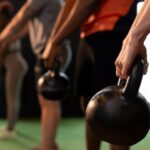
The Science of Rest
To comprehend the advantages of incorporating rest days into your fitness routine, it’s essential to grasp the scientific principles underpinning them. When you partake in physical activities, be they rigorous workouts or routine daily tasks, your muscles undergo microscopic tears. The significance of rest days lies in providing the necessary time for these tears to repair, fostering muscle growth and overall recovery.
Furthermore, adequate rest serves as a preventive measure against the potential hazards of overtraining. This condition can manifest as fatigue, diminished performance, and heightened vulnerability to injuries. In essence, embracing rest days is a strategic approach to optimising the benefits of physical activity while safeguarding against the detrimental consequences of excessive strain on the body.

Mental Restoration
The significance of rest days extends beyond mere physical recuperation, encompassing a crucial element of mental well-being. Prolonged and strenuous physical exertion can induce mental fatigue, resulting in a decline in focus and concentration. The introduction of rest days becomes instrumental in affording the mind a necessary respite, facilitating its recharge and thereby mitigating stress levels.
This mental rejuvenation not only aids in immediate relief but also holds long-term benefits. Over time, the restoration of mental well-being through designated breaks contributes to heightened productivity and enhanced creativity in one’s day-to-day life. In essence, recognizing the symbiotic relationship between physical and mental recovery underscores the holistic impact of incorporating rest days into a well-rounded lifestyle.

Preventing Burn Out
Persistently subjecting your body to rigorous activity without affording it adequate recovery time can pave the way to burnout. Burnout is characterized by a prolonged state of both physical and emotional exhaustion, and its repercussions can be severely detrimental to your overall well-being.
The integration of consistent rest days into your routine serves as a protective measure against burnout, establishing a crucial buffer. This strategic inclusion ensures that you maintain the sustainability of your physical and mental efforts over the long haul. In essence, by recognizing the potential dangers of burnout and implementing preventative rest days, you fortify your resilience and pave the way for enduring health and performance.

Optimising Performance
In contrast to the notion that continuous activity is the sole path to peak performance, the strategic integration of rest emerges as a pivotal factor in achieving optimal results. Athletes and fitness enthusiasts have increasingly adopted the concept of periodization, a structured approach involving planned cycles of both training and recovery.
The essence of this methodology lies in recognizing the importance of incorporating designated rest days into a routine. Such intentional breaks are instrumental in optimizing performance by providing the body with the necessary time to adapt and fortify itself, fostering strength and growth during the recovery phases. In essence, embracing this balanced approach acknowledges that peak performance is not solely a product of unceasing activity but is, in fact, a harmonious interplay between exertion and strategic recuperation.
How to Embrace Rest Days
Understanding the importance of rest days is the first step, but incorporating them into your routine can be a challenge. Here are some practical tips to help you embrace and make the most of your rest days,
Attuning yourself to the signals your body sends is paramount in maintaining overall well-being. Be attentive to indicators of fatigue, soreness, or a dip in performance, and when your body communicates the need for rest, it’s crucial to heed these signals.

Embracing rest days doesn’t necessitate complete inactivity; instead, consider engaging in active recovery activities like yoga, walking, or stretching. These lighter exercises promote blood flow and contribute to the overall recovery process. Prioritising a restful night’s sleep is equally essential for comprehensive physical and mental recuperation.

Seizing the opportunity of rest days to focus on proper nutrition provides your body with the essential nutrients it requires for effective recovery. Additionally, integrating mindfulness practices such as meditation or deep breathing into your routine can further alleviate stress, fostering mental recovery alongside the physical aspects. In essence, a holistic approach to rest involves not only recognizing the need for physical breaks but also incorporating complementary practices that support both body and mind.


